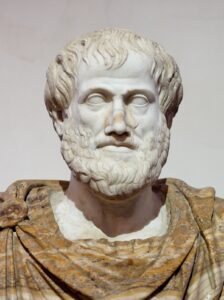Aristotle Biography and Works.

Aristotle, one of Plato’s greatest disciples, was born in 384 BC. He was a Greek philosopher and a polymath.
Aristotle’s father was a physician to the king of Macedonia. His father sent Aristotle to study at the academy when he was seven years old.
At the beginning, he was there as a student, then became a researcher and finally a teacher. He adopted and developed Platonic ideas there. When Plato died, Plato willed the Academy to his nephew, Speusippus and not to Aristotle.
Aristotle then went to Assos in Asia Minor to open a branch of the Academy. This particular Academy focused more on biology than its predecessor that relied on mathematics.
His writings covered many subjects – rhetoric, metaphysics, physics, poetry, music, theatre, politics, logic, linguistics, government, biology, ethics, and zoology.
He married the niece of another former student of Plato, Hermias. Pythias died after Pythias, ten years. During these years in Assos, Aristotle started to break away from Platonism and developed his own ideas.
Later, Aristotle was invited by King Philip of Macedonia in 343 BC to tutor his thirteen-ear-old don, Alexander.
King Philip was then murdered in 336 BC after which Alexander became the king. He mobilized his father’s great army and subdued some city-states, thus becoming ‘Alexander The Great’.
After Aristotle stopped teaching Alexander the Great, he returned to Athens in 335 BC.
Then, Aristotle founded his own school, which was named the Lyceum, named after the Greek God, Apollo Lyceus.
He died in Athens in 322 BC.
Trivia
Aristotle’s works that have survived from antiquity through medieval manuscript transmission are collected in the Corpus Aristotelicum.
- What is meant by Database Management System?
- Discuss the advantages and drawbacks of database.
- What do you mean by database ? Discuss its Characteristics.
- What is Data Mining?
- What are the conditions of communication?
- What do you mean by business communication ?
- organization / Differentiate between classical and modern theory of organization
- What is forecasting






